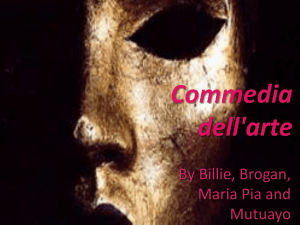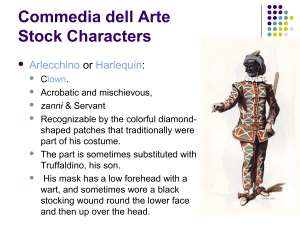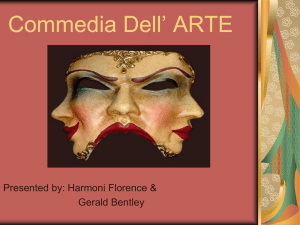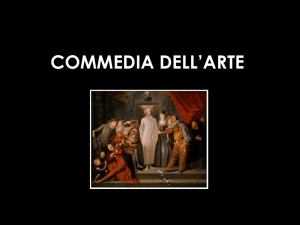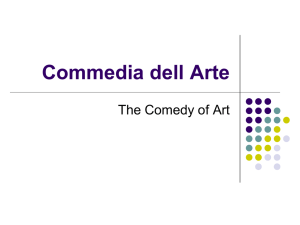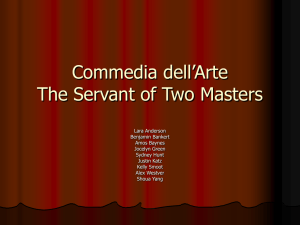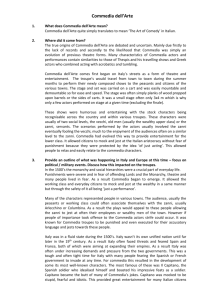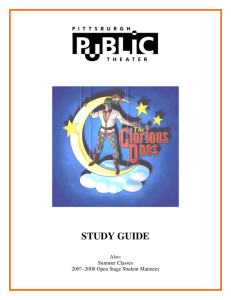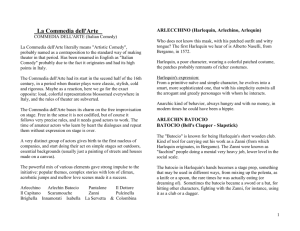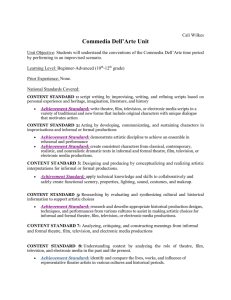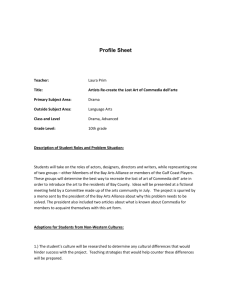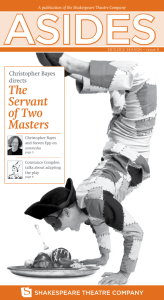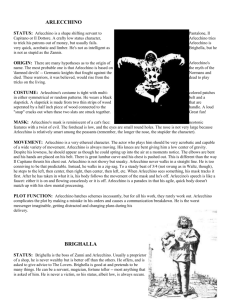Commedia dell`arte - Valley View High School
advertisement
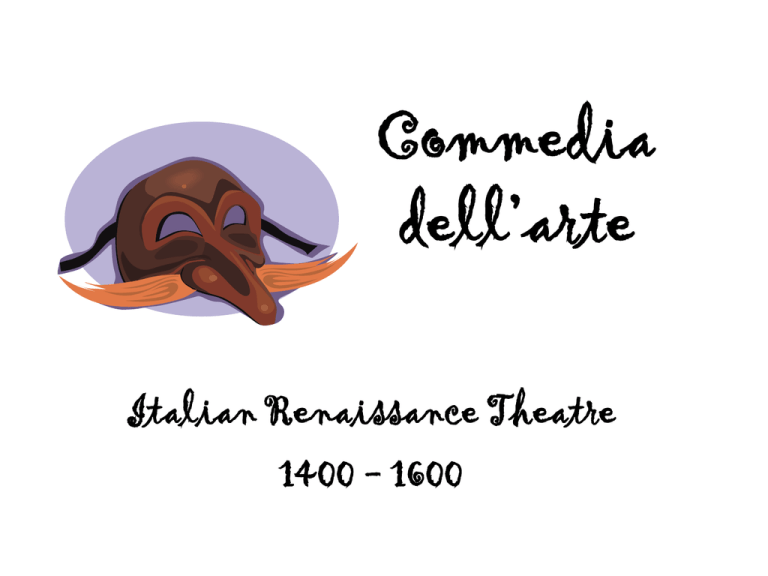
Commedia dell’arte Italian Renaissance Theatre 1400 - 1600 Commedia dell’arte Influences Trace back to early Roman street theatre – Public performances – Partially improvised – Troupes settled in cities, but moved locations within the city Roman playwrights: Terence & Platus – “borrowed” story-lines from the Classics Commedia dell’arte Terms to know • Commedia dell’arte - “play of professionals” • Scenario - Standard plot outline • Intermezzi - short “in-between” shows • Lazzi - bits of comic business • Stock characters - characters who remain the same in many different plays Commedia dell’arte Conventions Stages – Sometimes performed on the street or in a public square with no set – Also performed in theatres or music halls with wide variety of set – Helped develop the PROSCENIUM ARCH (picture frame) theatre style that is still the standard today Karel Dujardins , 1657 Commedia dell’arte Conventions Scenarios Most performances, the performers would agree on a basic scenario, the characters involved and the eventual outcome… everything else was left as improvisational material. Sample Scenarios: A - Pantalone enlists Arlecchino's help in getting a date with Lavinia, who doesn't know he exists. Arlecchino gives him a lot of bad advice about his clothes and how to act. B - Alessandra tries to get her father Pantalone's permission to marry Fabian. Commedia dell’arte Conventions Set SET – no standard set was used… playing space could be a plain street, a pageant wagon, a ballroom or dining hall Commedia dell’arte Conventions PROPS • The battacchio (called a “slap stick” in English) a club-like • object composed of two wooden slats produces a loud smacking noise, though little force is transferred from the object to the person being struck. Actors may thus hit one another repeatedly with great audible effect while causing very little actual physical damage. Typically carried by Brighella – The origin of the modern term “slapstick comedy” comes from this Italian device (think Charlie Chaplin, the 3 Stooges) Characters carried other misc. props befitting their occupation & station – Many characters had signature props. For eg: female lovers carried fans, male lovers carried handkerchiefs & a posy Commedia dell’arte Conventions Costumes & Masks • Actors wore stylized versions of modern clothing • stylized theatrical costumes can exaggerate some aspect of a character • Specific colors/patterns/cuts were used to portray characters' age, gender role, profession, social class, personality • Each stock character had his/her own “stock” costume & mask Commedia dell’arte Conventions Actors (CALLED PERFORMERS) – Skills needed: acrobats, dancers, musicians, singers, orators, quick wits, politically savvy (satire) – An actor often portrayed an individual character for so long that they were known by the character’s name, not their own. – WOMEN ALLOWED ON STAGE!!! Only place accepted until late 17th Century England – Acting companies that stayed & traveled together, approx. 10-12 people – I Gelosi – famous commedia acting company, all family: Francesco & Isabella Andreini Commedia dell’arte Conventions – Stock Characters Inamorati - The lovers • RANK - The lovers are of high status in their own. They are the sons and daughters of characters who are also high on the social ladder; very often the female lover is Pantalone's daughter (when she is not his daughter, the male lover is his son, and Pantalone lusts after her) • NAMES - usually have beautiful, flowery, romantic names • COSTUMES – they wore the latest Italian fashions. • MASKS – Lovers do not wear masks. They wear heavy makeup. • MOST COMMON LOVERS: (female) Donatella, Fabiana, Isabella, Ottavia; (male) Benedetto, Fabian, Giancarlo, Ottaviano Commedia dell’arte Conventions – Stock Characters The Innamorati These characters never developed, but were necessary for the action of the plays Commedia dell’arte Conventions – Stock Characters Vecchio (foolish elders) – RANK: rich, old, high ranking but not always well-respected – WHO: A category of aged, male characters. The primary members of this group are Pantalone, Il Doctoro and Il Capitano. The word means "old one" or simply "old" in Italian. They are overwhelmingly the antagonists, opposing the love of the inamorati; the comic ending is produced when the zanni manage to overcome them and unite the lovers. – MASKS: wore ½ masks with long noses, the longer the nose, the dumber the person – COSTUMES: dress to show wealth & look pretentious, often wear layers Commedia dell’arte Il Dottore Il Capitano Pantalone Vecchio – Masks & Costumes Commedia dell’arte Conventions – Stock Characters Zanni (clever servants) = (Columbina Arllechino, Brighella) – CHARACTER: (the name is where we get our word "zany") is a servant character who serves one of the Vecchi. He never does well at his job, since all he thinks about is food or sleep. Often, he is distracted while on a mission, after hearing the name of a fruit--or after falling asleep. Zanni is stupid, poor, and slow, and therefore is the lowest character on the social scale. – COSTUME: usually consists of a baggy white jumpsuit or shirt-andpants outfit, since he is too poor to afford anything else. – MASK: has a wrinkled forehead with low eyebrows, giving him a stupid appearance. He also has a very big, wide nose with nose hair. The larger the nose, the stupider the Zanni. – MOVEMENTS: are very big, broad, and exaggerated. He leads his body with his head and nose (his nose sticks out way in front of the rest of his body, and wherever his head goes, his body follows). Commedia dell’arte Zanni – the servants Columbina Arllechino Brighella Commedia dell’arte Influences Here are just some of the ways Commedia has influenced the world since the Renaissance… • • • • • English vocabulary: "pants" from Pantalone, "zany" from the Zanni, Harlequin from Arlecchino. “Romeo & Juliet” = a translation of Flaminio la Scala's collection of scenario (published in 1611) (taken from the argument, or introduction to the play): There lived in Florence two gentlemen called Pantalone and Gratiano. They were of old and noble families, and bore a long hatred for each other ... (can you guess what’s next?) Moliere used stock characters in his plays. Modern screenplays: follow common scenarios, use stock characters (teen films) TV shows: scenarios & characters (“The Simpsons” and many others)
